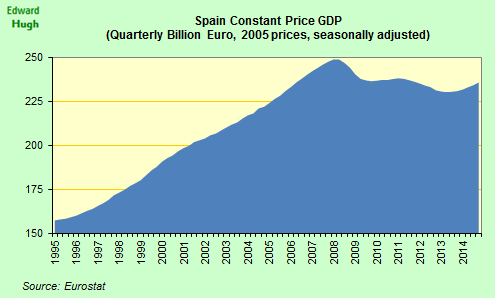I think Spanish has a suitable word for this kind of persistent badtiming: "gafé". But the thing is, if Europe's leaders insist on continually showing the markets just how "gafé" they all are, then we are never going to find our way out of this hole we have all dug for ourselves.
And so it was, that by 16:30 this afternoon the yield on 10 year Spanish bonds hit 5.5% (up from around 5.2 at Friday's close), and the spread over equivalent German Bunds hit a Euro-era record high of 273 basis points. These sort of numbers were totally unimaginable at the start of 2010.

The root of the problem comes from the fact that the EU Commission had identified today as the day when their economic forecasts for national economies were to be published, and so it was. As part of the forecast the commission fractionally lowered its 2011 growth outlook for Spain, to 0.7% from an earlier expectation of 0.8%. Hardly earth-shattering news, and not normally the sort of thing to send bond yields off into a "death spiral", but given the times we live in, markets are extraordinarily sensitive to any such revision. In fact, a downward revision of 0.1 percentage point is well within the bounds of any reasonable margin of error, and no one really has the foggiest idea of what Spanish growth will actually look like next year beyond the most approximate of approximate guesses. This is because the degree of uncertainty is unusually high in the external environment, and the impact of the very strong fiscal correction that is planned (from this years 9.2% deficit, to next years 6% one) is very hard to evaluate. Personally I think it will be very hard for Spain to get positive GDP growth at all next year given all we are seeing, but I certainly don't want to engage in a Dutch auction with the Spanish authorities on this point.
But in fact the potential difficulties for Spain to achieve the 6% target for 2011 were already reasonably well known. I had already written about it in this post, were I pointed out the difficulty Spain's regional and local governments were having this year in meeting targets, and how important it was going to be to stick by the letter of next years budget plan if the administration did not wish to face the wrath of the markets.
My points were backed up the day after by Bank of Spain Governor Miguel Angel Fernandez Ordonez, who told a Spanish parliamentary committee that:
“Recent budget data point to the achievement of objectives for 2010, at least for the central government.... but (as far as the regional governments go) my impression is that the measures [they've announced] are far from sufficient”
The Bank of Spain governor reinforced this point by adding that in a highly decentralized Spain, where the central government directly controls less than a third of spending, and lacks sufficient means to supervise the fiscal policies of regional and local administrations, it was extremely difficult for the central government to get an exact result. His opinion was that these august bodies be required to publish budget data in a more timely fashion and be given an annual spending ceiling. In fact, these days the Spanish government cannot afford to ignore what the Governor of its Central Bank says, and so the administration has gone some way to putting such controls in place, but whether they are sufficient to do the job or not still remains to be seen.
Mafo's point was backed up later the same week by former Bank of Spain deputy governor and current IMF Official José Viñals, who stated "Spain should be willing to carry out additional fiscal adjustments to achieve a budget deficit of 6 percent of gross domestic product by 2011 because markets have “zero tolerance” for failure to meet stated targets."
So these issues are already known, Spain may well need to formulate a plan "B" if the governments hand is forced, but it was a pity to unsettle the markets just one more time by raising them again precisely today.
Not everything in the report was bad news for Spain, however, since the commission did improve its forecast for this year. The EU now expects the country's GDP to contract by 0.2% in 2010, compared with the 0.4% contraction it had projected in the spring forecast, giving a little more power to the elbow of a struggling Elena Salgado who has recently been belabouring the point that her forecasts are better than those of the EU and the IMF. But next year will be the "test of fire" on this front, since it is starting next year that all those rather optimistic expectations on domestic consumption start to lock-in.
Having said that, the EU now predicts that annual average unemployment will rise again next year, and hit 20.2% (above Salgado's forcecast). In fact this may well be an underestimate, since the September figure was 20.8%, and at the present time unemployment is still rising, and not falling. Indeed Olli Rehn himself stressed that there were "significant but balanced risks to the baseline scenario." And in particular he pointed out that further drops in house prices could lead to a "deeper-than-expected adjustment in construction, dent household wealth and sap consumer confidence." And yet that is just what Spain seems to continue to be facing, a slow drop-by-drop downward trickle in house prices.

So what can the Spanish government do to stop the rot? Basically at this point very little. The ammunition has nearly all been fired off, and most of it has been wasted. And yet one more time we all seem to be in agreement. When asked what Spain and Portugal should do to stop the so-called contagion, I was quoted by the Financial Times as saying: “Not do anything wrong..... The only thing you can advise these people to do at this stage is to be absolutely frank and stick absolutely to what they say.” “From this point on, the more you do fiscal austerity, the more you contract and the less you can pay".
The following day Manuel Campa, Spain's deputy finance minister for the economy was quoted by Bloomberg in a similar vein as saying that the best thing “to generate credibility in the Spanish economy is to execute the measures we have announced at the time and in the way they were announced, and that implies not taking additional measures.”
And as luck would have it Miguel Angel Fernandez Ordonez was back before the Spanish senate the following day (his timing, unlike that of Olli Rehn, seems to be impeccable), telling all those senators that “We have to convince people that we’re going to do exactly what we said we were going to do.” Seems logical, doesn't it, I mean whyever would they imagine you might not do what you say you are going to do? Whatever put that wicked thought in their heads?
And Mafo was also on this occasion perfectly frank about the growth situation: "The outlook for a gradual recovery is surrounded by uncertainties," he told the senators."In an environment where financing conditions will foreseeably remain restrictive and in which the public and the private sector have a pressing need to clean up their financial position, we can expect the pace of recovery in household consumption to slow versus the first half of the year."
I couldn't have put it better myself.
So, summing up. Spain is suffering from the serious restrictions imposed on trying to make a major economic correction while participating in a monetary union (Paul Krugman is once more making similar points in today's New York Times). In particular this means that not only does the country not have a currency to devalue, it does not have a central bank with capacity to print money and buy its bonds. It also has a very substantial exposure in terms of the external position (ie debt) that makes it dependent on international financial markets for funding in a way that means that the extremely low interest rates that are on offer at the ECB are not really (beyond some limited non standard liquidity measures) passed on to the countries banks, her citizens, her companies or her government.
Spain has the benefits of neither expansionary fiscal or monetary tools in the midst of a huge output slump, where the underlying contractionary tendencies in the economy are still substantial. Given all of this, and given that Spain's leaders have at last shown some signs that they are aware of the seriousness of the situation that faces the country, I think it is being cruel beyond belief to haggle over whether the deficit next year will be 6% or 6.4%, let alone send Spanish bond values into a suicidal downward spiral that risks destroying what is still left of the countries banks over the issue.
Spain needs to stick to its deficit reduction targets, but it also needs more help from those who are running the system by which it is trapped and which it is struggling hard to defend. Pile the pressure on and the country is only going to crack. What Spain needs is to get back to growth, and to put people back to work, then the deficit problems will sort themselves out almost on their own. And in this sense it is the authors of the latest EU forecast, and not those who run the Spanish administration who are the unrealistic ones. Spain is in a corner which it can't get out of alone. She needs help, and that help is going to have to come from the top.
As Krugman says:
If Spain still had its own currency, like the United States — or like Britain, which shares some of the same characteristics — it could have let that currency fall, making its industry competitive again. But with Spain on the euro, that option isn’t available. Instead, Spain must achieve “internal devaluation”: it must cut wages and prices until its costs are back in line with its neighbors.
And internal devaluation is an ugly affair. For one thing, it’s slow: it normally take years of high unemployment to push wages down. Beyond that, falling wages mean falling incomes, while debt stays the same. So internal devaluation worsens the private sector’s debt problems.
Internal devaluation is coming, there is now no avoiding it. When I advanced the idea for Spain some three years ago it wasn't some sort of contribution to a collective brainstorming session, it wasn't just one option on offer together with a whole series of others. What I was saying was if we don't go down this path then would would inevitably end up where we are now. But as Krugman points out, seeing it through means the private sector debt problem will only deteriorate, which is why we need help, to share the burden. The other alternative, of seeing the Euro fall apart, is in the interests of no one. Not even the Germans, who would soon see the current record growth in their exports shifted into reverse gear as the new DeutscheMark was quoted at values (as is happening to the Japanese yen right now) which robbed the country of all semblance of competitiveness.
Well, today we have a new government in Catalonia. So maybe its time to change. Maybe finally we could now start to address the problems of the Spanish economy head-on, and put the future of the country on a sound and sustainable footing. It's certainly worth a try, and, at least, as the English saying goes: where there's life, there's hope.












